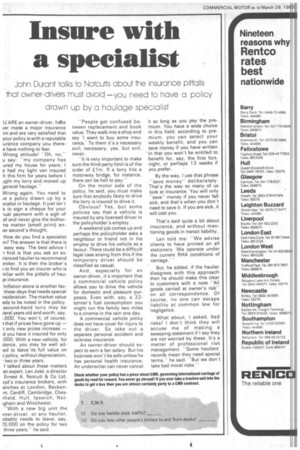Insure with a specialist
Page 70

If you've noticed an error in this article please click here to report it so we can fix it.
John Durant talks to Notcuits about the insurance pitfalls that owner-drivers must avoid —you need to have a policy drawn up by a haulage specialist
U ARE an owner-driver, hate ver made a major insurance im and are very satisfied that your policy is with a reputable ;urance company you theree have nothing to fear.
Wrong attitude! "Oh, no," u say: ''my company has ured my house for years: I
o had my light van insured h this firm for years before I J ght my lorry and moved up )eneral haulage."
Wrong again. You need to re a policy drawn up by a .1cialist in haulage. It just isn't
e to sign a cheque for your mai payment with a sigh of ef and never give the bother-ne matter (small print) anier second's thought.
How do you find a specialist 3n? The answer is that there is easy way. The best advice I -I find is that you ask an exrienced haulier to recommend )roker. It is then the broker's ) to find you an insurer who is niliar with the pitfalls of haule insurance.
Inflation alone is another feethese days that needs special nsideration. The market value eds to be noted in the policy. second-hand lorry may be Teral years old and worth, say, .,000. You won't, of course, t that if prices have gone up — t only new prices increase — d you have it insured for only .000. With a new vehicle, for ;tance, you may be well ad;ed to leave' its full value on • i policy, without depreciation, 'two or three years,
I talked about these matters an expert, Len Jose, a director Ernest A. Notcutt & Co Ltd, )yd's insurance brokers, with anches at London, Beckenm, Cardiff, Cambridge, Chesrfield, Hull, Ipswich, Notigham and Winchester.
"With a new big unit the vner-driver, or any haulier, obably needs to leave, say, ?0,000 on the policy for two three years," he said. 'People get confused between replacement and book value. They walk into a shop and say 'I want to buy some insurance.' To them it's a necessary evil; necessary, yes: but evil, never.
"It is very important to make sure the third-party limit is of the order of El m. If a lorry hits a motorway bridge, for instance, there can be hell to pay."
On the motor si.de of the policy, he said, you must make sure that anybody likely to drive the lorry is insured to drive it.
Obvious? Yes, but some policies say that a vehicle is insured by any licensed driver in the policyholder's employ.
A weekend job comes up and perhaps the policyholder asks a neighbour or friend not in his employ to drive his vehicle as a favour. There could be a difficult legal case arising from this if the temporary driver should be classified as casual.
And, especially for an owner-driver, it's important that a commercial vehicle policy allows you to drive the vehicle for domestic and pleasure purposes. Even with, say, a 32tonner's fuel consumption you might run the family two miles to a cinema in the rain one day.
A commercial vehicle policy does not have cover for injury to the driver. So take out a separate personal accident and sickness insurance.
An owner-driver should expect to earn a fair salary. But his business won't be safe unless he has personal health insurance. An underwriter can never cancel it so long as you pay the premium. You have a wide choice in this field; according to premium, you can select your weekly benefit, and you can save money if you have written in that you won't be entitled to benefit for, say, the first fortnight, or perhaps 13 weeks if you prefer.
By the way, I use that phrase 'save money'' deliberately. 'That's the way so many of us look at insurance. You will only "save" money if you never fall sick, and that's when you don't need to save it. If you are sick, it will cost you.
That's said quite a bit about insurance, and without mentioning goods in transit liability.
Len told me: "We advise clients to have printed on all stationery 'We operate under the current RHA conditions of carriage.'
But, he added, if the haulier disagrees with this approach then he should make this clear to customers with a note "All goods carried at owner's risk" on all correspondence. Of course, no one can escape liability at common law for negligence.
What about, I asked, bad risks? I don't think they will accuse me of making a sweeping statement if I say they are not worried by these. It's a matter of professional risk management. "Some hauliers' records mean they need special terms,he said. "But we don't take bad moral risks."




























































































































